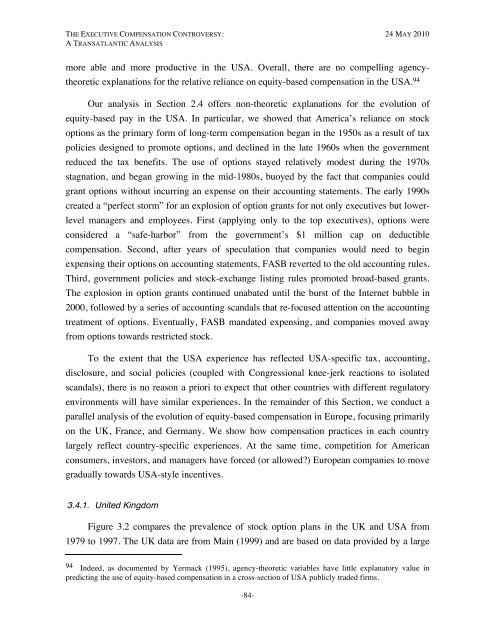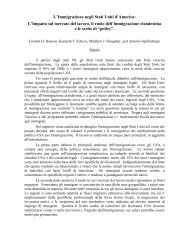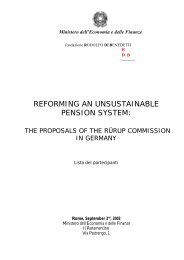The Executive Compensation Controversy - Fondazione Rodolfo ...
The Executive Compensation Controversy - Fondazione Rodolfo ...
The Executive Compensation Controversy - Fondazione Rodolfo ...
You also want an ePaper? Increase the reach of your titles
YUMPU automatically turns print PDFs into web optimized ePapers that Google loves.
THE EXECUTIVE COMPENSATION CONTROVERSY: 24 MAY 2010A TRANSATLANTIC ANALYSISmore able and more productive in the USA. Overall, there are no compelling agencytheoreticexplanations for the relative reliance on equity-based compensation in the USA. 94Our analysis in Section 2.4 offers non-theoretic explanations for the evolution ofequity-based pay in the USA. In particular, we showed that America’s reliance on stockoptions as the primary form of long-term compensation began in the 1950s as a result of taxpolicies designed to promote options, and declined in the late 1960s when the governmentreduced the tax benefits. <strong>The</strong> use of options stayed relatively modest during the 1970sstagnation, and began growing in the mid-1980s, buoyed by the fact that companies couldgrant options without incurring an expense on their accounting statements. <strong>The</strong> early 1990screated a “perfect storm” for an explosion of option grants for not only executives but lowerlevelmanagers and employees. First (applying only to the top executives), options wereconsidered a “safe-harbor” from the government’s $1 million cap on deductiblecompensation. Second, after years of speculation that companies would need to beginexpensing their options on accounting statements, FASB reverted to the old accounting rules.Third, government policies and stock-exchange listing rules promoted broad-based grants.<strong>The</strong> explosion in option grants continued unabated until the burst of the Internet bubble in2000, followed by a series of accounting scandals that re-focused attention on the accountingtreatment of options. Eventually, FASB mandated expensing, and companies moved awayfrom options towards restricted stock.To the extent that the USA experience has reflected USA-specific tax, accounting,disclosure, and social policies (coupled with Congressional knee-jerk reactions to isolatedscandals), there is no reason a priori to expect that other countries with different regulatoryenvironments will have similar experiences. In the remainder of this Section, we conduct aparallel analysis of the evolution of equity-based compensation in Europe, focusing primarilyon the UK, France, and Germany. We show how compensation practices in each countrylargely reflect country-specific experiences. At the same time, competition for Americanconsumers, investors, and managers have forced (or allowed?) European companies to movegradually towards USA-style incentives.3.4.1. United KingdomFigure 3.2 compares the prevalence of stock option plans in the UK and USA from1979 to 1997. <strong>The</strong> UK data are from Main (1999) and are based on data provided by a large94 Indeed, as documented by Yermack (1995), agency-theoretic variables have little explanatory value inpredicting the use of equity-based compensation in a cross-section of USA publicly traded firms.-84-









